Deborah J. Ross's Blog, page 36
August 13, 2021
Very Short Book Reviews: Memory Glitches, Anime Aliens, and More!
 Take a Look at the Five and Ten, by Connie Willis (Subterranean)
Take a Look at the Five and Ten, by Connie Willis (Subterranean) Every family has its oddballs and oral history. In Ori’s uncomfortable extended stepfamily, the oddball is elderly Grandma Elving, with her endless, repetitive, boring, detail-ridden stories about the one Christmas she worked at Woolworth’s. Somewhat to Ori’s surprise, her cousin’s current boyfriend, Lassiter, is actually interested in Grandma Elving’s stories and wants to study her with a new memory-enhancing drug for his dissertation. With Ori as Grandma Elving’s chauffeur and caretaker, the experiment proceeds and Lassiter becomes convinced he’s on the brink of uncovering a decisive traumatic event in Grandma Elving’s life. A love story emerges from the past, just as Ori realizes she has fallen in love with Lassiter.
There’s a mystery here, of course, and a sweet romance, but the real pleasure lies in the wonderfully rich, quirky characters. My one quibble is that we used to call Woolworth’s the Five and Dime, not Five and Ten (and I never worked there), but maybe that’s a geographic difference.
A Question of Navigation, by Kevin Hearne (Subterranean)
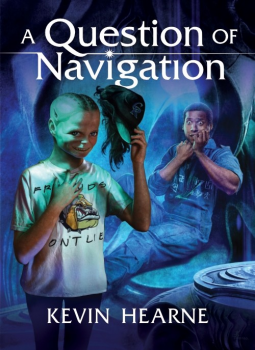
I’ve read enough of Kevin Hearne’s work to know that his name on the cover guarantees a great read, often laced with quirky humor. This tale of alien abduction and prisoner rebellion is no exception. The narrator is physicist Clint, the aliens look like ultra-perky anime schoolgirls, and Clint’s T-shirt reads DO NOT EAT. Unlike the thousands of his fellow humans being stored as food for the long journey back to the alien home planet, Clint and a handful of other specialists are being kept alive to reveal humanity’s weaknesses in the most entertaining fashion possible. The survival of Earth seems a lost cause, between the aliens’ paralytic stingers, their complete control of the ship, and their ability to eavesdrop on any conversation. But put together a physicist, a marine biologist, a meteorologist, an expert in robotics, and a few equally qualified scientists, and mayhem is sure to result.
The ending is gloriously satisfying.
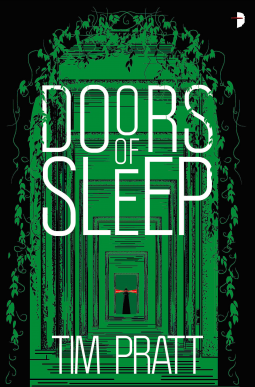 Doors of Sleep: Journals of Zaxony Delatree, by Tim Pratt (Angry Robot)
Doors of Sleep: Journals of Zaxony Delatree, by Tim Pratt (Angry Robot)I’ve always loved stories that take place on one fantastically alien world after another, so I grabbed this book on the dual strengths of its author (Tim Pratt, master of space drama) and its premise. Every time Zax Delatree falls asleep, he travels to a different multiverse. Some worlds are eerily similar to his own highly technological world where he facilitates harmony, but others are devoid of life or filled with intelligent, carnivorous life, or gigantic gardens or bombed-out cities. He’s been traveling this way for a few years now, with no idea how or why. From time to time, he’s acquired companions, one of whom created a linguistic virus that allows Zax to understand the languages he encounters, and another, a farmer who can communicate with and control plant life, and yet another, a crystalline intelligence desperate for new horizons. Quickly Zax shifts from unwilling (and insomniac) tourist to fugitive. Someone’s on his trail, able to track him across multiverses, and that someone has just teamed up with a murderous, shape-shifting fungus.
The story is at once dramatic, playful, grim, inventive, and just plain fascinating. Zax sometimes reminds me of Doctor Who or The Flying Dutchman With a Heart of Gold. I definitely want to keep traveling with him!

August 6, 2021
Book Reviews: Reform School for Wayward Supernatural Teens
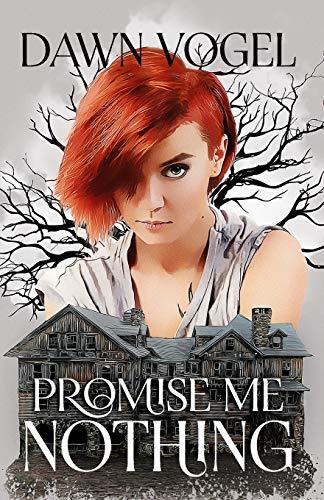 Promise Me Nothing, by Dawn Vogel (DefCon One Publishing)
Promise Me Nothing, by Dawn Vogel (DefCon One Publishing) The snappy voice of Briar, the teenage fae who also might be a mass murderer, drew me in right away. Exiled from the realm of Idyll (for reasons that become apparent only later in the story) to the human world, she finds herself in juvie detention. Just as her life looks unremittingly grim, she’s unexpected offered a place at the mysterious private Dedwydd Academy. Here she’s assigned not only group and individual therapy sessions but classes in Anger Management, Algebra, and The Psychology of Terror. Her fellow students are not only supernatural folk like witches, angels, and demons, but also human changelings who have been harmed by the fae. Gradually she realizes that Dedwydd just might be the third chance she needs, a place where she can make real friends and learn to control her fae abilities. Then she finds a stone tucked into her bedding, one highly toxic to her kind. Who’s trying to murder her – and why?
Even before the Harry Potter series, “magical school” stories had strong appeal. Promise Me Nothing stands out for its great characters, strong voice, intelligence, and beautifully interwoven plot lines. Vogel offers just the right amount of backstory without bashing the reader of the head. She trusts her readers to make connections, even as Briar herself figures out the mystery while figuring out herself. It’s all very well done, with smooth prose, a dramatic mystery, and the kind of coming-of-age emotional journey that makes Young Adult fantasy satisfying for adult as well as teen readers.

July 30, 2021
Book Reviews: Women Seizing Power

The Women's War, by Jenna Glass (Del Rey)
Reminiscent of both C.L. Polk’s The Midnight Bargain and Louise Marley’s The Terrorists of Irustan, this world’s women, although as capable as men of using magic, are denied its practice. Their value lies in the marriage alliances they can bring and the magic their sons may inherit. In the dominant Western European-style realm, even women from rich and aristocratic families are treated as chattel, discarded at whim into The House of the Unwanted and a life of prostitution and economic slavery. The story weaves together the lives of a number of women caught in different ways in this pernicious system: the widowed daughter of a king, despised by her half-brother and desperate to protect her children; one of the Unwanted, thrust from sex slavery into leadership, for which she feels singularly unprepared; the despised wife of the heir to the throne who sees her only worth in her unborn child; the princess royal of a small kingdom, destined to save her people by sacrificing love for marriage.
The world changes dramatically when several kinswomen, who have been practicing and refining their magic secretly, enact a curse over all the realms, and then perish. With their deaths, no one can reverse what they have done. The curse ensures that no woman shall be pregnant unwillingly. Across the realms, women who are not truly willing to bear children either miscarry or fail to conceive.
Political chaos threatens. Scapegoated and then exiled, the surviving Unwanted journey to a barren land, that guarantees extreme hardship and poverty. What they discover there will change their world even more than the curse.
The women and their plight, their courage, and most of all, the way they learn to work together swept me up from the first chapter.

July 29, 2021
Deborah Goes Blackberry Picking (a video adventure)
Join me and my daughter, Sarah, as we pick blackberries, observe bees enjoying fennel pollen, and turn blackberries into compote.

July 23, 2021
Book Reviews: Superb Sea-Faring Fantasy

In this highly original, vividly depicted world, ships powered by magical flames sail across an ocean of exotic grasses. Crews harvest the lucrative psychoactive plants, although the area around the principal island has been growing increasingly barren of such prizes. A mob boss is gradually taking control of the free ships by rationing their access to drinking water, a vanishingly rare resource. The Forever Sea presents its own dangers. Pirates sail the grasses, of course. Exceptionally nasty ones, who slaughter vanquished captains for their bones to fuel the flames. Below the surface, dragons lurk, as well as even more fantastically gruesome, lethal creatures. For any ship that can reach it, the legendary Once City beckons.
Into this world comes Kindred, a young hearthfire keeper with a rare, intuitive gift for singing to the flames. Granddaughter to a legendary captain, Kindred struggles against both the ordinary dangers of the Forever Sea and the restrictions of the hearthfire keeper academy. To make matters worse, her grandmother has disappeared, leaving cryptic messages about the world beneath the surface of the sea. Kindred’s voyage will test her loyalty to her ship, captain, and crewmates, against the longing of her heart to follow in her grandmother’s path.
This is a huge, gorgeous story. The world-building is highly original and filled with brilliant details. The characters have depth and complexity, and most of all, heart. Their choices – loyalty to the ship, to each other, to themselves – their mistakes and losses and triumphs, their loves and grudges, all exemplify what it is to be human. At times the narrative read like prose poetry, and I had to slow down to savor it.
Superb storytelling in a brilliantly original world with memorable characters make The Forever Sea a stand-out.

July 22, 2021
New Interview!

I was interviewed by NF Reads. Here's a sample:
# How do you deal with creative block?
For a long time, I used to joke that I couldn’t afford writer’s block. I began writing professionally when my first child was a baby and I learned to use very small amounts of time. This involved “pre-writing,” going over the next scene in my mind (while doing stuff like washing the dishes) until I knew exactly how I wanted it to go; when I’d get a few minutes at the typewriter (no home computers yet), I’d write like mad. I always had a backlog of scenes and stories and whole books, screaming at me to be written. The bottleneck was the time in which to work on them. Now I understand that it is indeed possible to run into a brick wall, creatively speaking. This usually means there is an issue in my set-up or I need more time to mull over a problem that just under the surface. In all of these cases, the best thing I can do is to write something else: a journal, poetry (I’m a terrible poet), blog posts, something hideously self-indulgent and unpublishable, letters, shopping lists…the point is to keep the words flowing while the “back” part of my mind sorts things out.

July 19, 2021
“Plain Speech” and Spiritual Intimacy in The Seven-Petaled Shield
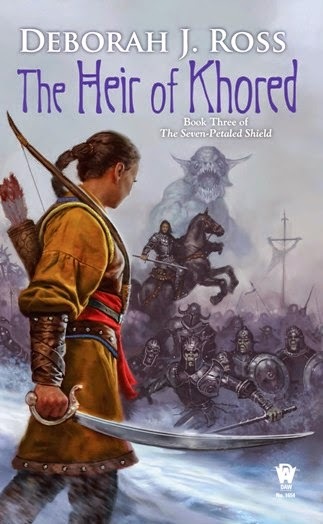 One of the aspects of world-building that I most enjoy is creating religious and spiritual traditions. Each of the cultures in The Seven-Petaled Shield conceptualizes the relationship between human and spirit in a different way. On the vast Azkhantian steppe, the nomads live in harmony with the seasons. They depend on their flocks and particularly their fast, agile horses not only for sustenance but defense. Their primary deity is, of course, Mother of Horses. By contrast, Meklavar is an city-state with an ancient tradition of written scripture; its religion is monotheistic and non-gendered (the Source of Blessings is never referred to as He or She); literacy is highly valued as a way of preserving the cultural and religious heritage.
One of the aspects of world-building that I most enjoy is creating religious and spiritual traditions. Each of the cultures in The Seven-Petaled Shield conceptualizes the relationship between human and spirit in a different way. On the vast Azkhantian steppe, the nomads live in harmony with the seasons. They depend on their flocks and particularly their fast, agile horses not only for sustenance but defense. Their primary deity is, of course, Mother of Horses. By contrast, Meklavar is an city-state with an ancient tradition of written scripture; its religion is monotheistic and non-gendered (the Source of Blessings is never referred to as He or She); literacy is highly valued as a way of preserving the cultural and religious heritage. Gelon is a nation of scientists, empire-builders, and cultural magpies, freely appropriating what they deem worthy from the cultures they conquer. It seemed logical to me that their formal religion would include a pantheon of gods. People would worship different gods according to their status (King’s-god), occupation (One Who Blesses Commerce, Guardian of Flocks, Protector of Soldiers), personal concerns (Source of Fertility, Bringer of Sleep), idealism and aspiration (Essence of Beauty, Giver of Justice), or solace (God of Forgotten Hopes, Sower of Mischief, Kindler of Hearts). Many of these are embodiments or aspects of historical gods – Essence of Beauty is surely the Gelonian version of Venus or Aphrodite.
Some of these gods are lofty, looking down on the plight of their human devotees with indifference. But others are more friendly and accessible, attending to everyday domestic affairs and not the fate of the world. In designing the Gelonian pantheon, I wanted the qualities of nurture and compassion to be present in a variety of forms, but I also wanted a specific deity who embodied these characteristics. I took my inspiration from a variety of sources – the Buddhist Kwan Yin, Mary in the Christian tradition, and the Shechinah or feminine aspect of the Jewish god. It seemed logical that a system as varied as the Gelonian pantheon would include such a figure, so I called her the Lady of Mercy.
While most of the other Gelonian sects provide background (with the notable exception of that belonging the Scorpion god, Qr, which has been appropriated by the awakening Fire and Ice), the followers of the Lady of Mercy play an active role in the beginning of The Heir of Khored (the third book of The Seven-Petaled Shield).I wanted to also take this opportunity to show positive aspects of Gelon – the people of goodwill and kindness who are to be found in every society. One important aspect was the ability to treat every person compassionately. Not just sympathetically, but as one divine creation to another. In Hinduism, one might greet another by saying Namaste,"The divine (or light) within me salutes the divine within you.” In Western terms, Martin Buber described this relationship as “I-Thou.”
 Drawing, A. Durer (1508)Conventional contemporary English does not have a pronoun that expresses respect and tenderness. Romance languages do, as did earlier forms of English (hence the “thou,” equivalent to the French this combination of tu.) With only a few exceptions, this usage has fallen into disuse in favor of the anonymous singular/plural “you.” To most people, thee and thou feel not only archaic but “high-falutin’”.
Drawing, A. Durer (1508)Conventional contemporary English does not have a pronoun that expresses respect and tenderness. Romance languages do, as did earlier forms of English (hence the “thou,” equivalent to the French this combination of tu.) With only a few exceptions, this usage has fallen into disuse in favor of the anonymous singular/plural “you.” To most people, thee and thou feel not only archaic but “high-falutin’”.One of the communities in which the use of thee and thou persisted longest is the Religious Society of Friends, or Quakers. Originally, Quakers addressed everyone in this way, regardless of rank. They refused to use one term for a social superior and another for an equal or inferior because they saw all people as equal. For the same reason, they refused to tip their hats to aristocrats. Needless to say, this custom landed quite of few of them in prison. They called the use of thee/thou “plain speech,” as opposed to one set of terms under one social circumstance and another in another (“fancy speech”? “complicated speech”?). Over the centuries, Quakers, particularly American Quakers, simplified the usage even further by using only “thee.” While grammatically incorrect, this shift furthered the cause of simplicity.
This “down home” version struck me as ideal for the cult devoted to the Lady of Mercy, especially for those who lack formal intellectual education and express humility and consideration for others. Language, including all the various forms of jargon, helps to define a community, who’s “in the know” or initiated into the mysteries, and who’s baffled or excluded. It can be as simple as a specific meaning for an ordinary word, words and phrases not in general usage, or references and metaphors that have specific meanings for that particular group – references to experiences and knowledge not shared with the “outside world.” Words can also remind us of our shared goals and values. In the case of “plain speech” and the monks of the Lady of Mercy, the use of an intimate second-person pronoun provides a reminder to treat that person with respect and kindness.
Of course, in any community, individuals achieve their goals to a greater or lesser degree. When one of those goals is compassion, people are apt to fall short under times of stress or interpersonal friction. Just because a person says, “thee” doesn’t mean he cannot also be hostile, irritated, manipulative, critical, etc. One of the things I wanted to do with this quirk of language was to show that for some individuals, it helps to focus their intention and expresses how they put the precept of universal kindness into action. For others, it provides a contrast between what is said and what is done – for example, when the Father Monk uses “thee” in the process of imposing his own dogmatic agenda on other characters.

July 16, 2021
Short Book Reviews: Romantic Military Science Fiction
 The Rush's Edge, by Ginger Smith (Angry Robot)
The Rush's Edge, by Ginger Smith (Angry Robot) Is there such a thing as romantic military science fiction? If not, Ginger Smith is inventing the field. In this dystopic, far-flung star empire, human soldiers are too costly to waste in battle, so technologically enhanced vat-grown troops have become the era’s cannon fodder. With accelerated growth, limited life expectancy, and nearly unbreakable psychological conditioning, they’re considered expendable during their term of service and disposable afterward. One such retired vat soldier, Hal, has found sanctuary in a salvage ship captained by his former CO, Ty. Hal, like other vats, is addicted to the overwhelming adrenaline rush of combat, which will rapidly burn him out, but Ty has been able to talk him down from the worst episodes. Into this tight ship family comes Vivi, a young tech expert fleeing an abusive relationship. As her mind and body heal, she and Hal grow closer, although Hal is still subject to being triggered into the “rush,” and each bout shortens his already fast-shrinking span. Various adventures ensue, pitting this small crew against the Coalition Powers That Be (and their fear of the growing power of vat-grown soldiers). The gradually developing love story is interwoven throughout, neither hijacking the action nor feeling like a pasted-on element. It’s integral to how humans bond to another, how trust and devotion not only heal the past but form the foundation of hope. It’s a lovely tale, at times page-turning drama, at times heartfelt, always reflecting what makes a person and what are the limits of personal autonomy.

July 9, 2021
Book Review: A YA School Story Mystery Falls Short
 The Temple House Vanishing, by Rachel Donohue (Algonquin Books)
The Temple House Vanishing, by Rachel Donohue (Algonquin Books)I requested an ARC of this book based on the description: a mystery set in a Catholic boarding school. Twenty-five years before the opening, Louisa, a brilliant but lonely student, and Mr. Lavelle, a charismatic art teacher, have mysteriously disappeared. Victoria, who knew them both, has just committed suicide at the school itself. Why did she kill herself? What happened to Louisa and Mr. Lavelle? Did they elope together? Were they murdered or did they perish through an accident? Or were the disappearances unrelated? The atmosphere of an isolated Victorian mansion set on a cliff in Ireland added to the appeal.
Very early in the book, however, I became increasingly disappointed and frustrated. By the end, I was ready to throw the book across the room in disgust, except that I was reading it on my Kindle and I don’t treat my electronic devices so cavalierly. Based on the description, The Temple House Vanishing promised me a genre novel – YA, school story, and mystery, all in one – and yet it consistently violated the conventions of all three.
The opening point of view, a journalist who happened to live on the same street as Louisa and who is investigating the disappearance, was hard to relate to and never made any sense to me. She isn’t involved in the events, and her own life, irrelevant to the rest of the story, seemed remote and uninteresting. Then we get into Louisa’s story, narrated by herself. Therein lies the second hurdle, because Louisa doesn’t sound or act like a teen, even one who’s stuck in her head. Almost all teens, whether intellectual “brains” or not, center their lives around the fundamental issues of those years: independence from parents, confusion about who they are and what they want to become, desperate need for approval from peers, and so forth. Hormones saturate their bloodstreams, and the parts of their brains associated with executive functions, delayed gratification, and long-term planning, won’t mature until their mid-20s. It doesn’t matter how bright or academically gifted they are, they are still at the mercy of these internal storms. Louisa’s first-person narrative reads like the overly elitist pontifications of a writer with a very poor memory of her own teenaged years, or perhaps one seen through extremely adult-colored lenses, and with no understanding of the conventions of the genre. I cannot imagine a teen reader finding Louisa believable or interesting.
Then we meet Victoria, who becomes the object of Louisa’s bloodless passion. Both girls exhibit a disconnection between their intellectual philosophizing and their relationships so extreme as to verge into psychotic dissociation. I never perceived, through their speech or behavior, or through the inner voice of the narrative, any shred of genuine emotion until very near the end, when it became clear that Louisa was just as infatuated with Victoria as Victoria was with Mr. Lavelle. But for the most part, each experiences a pale, distant imitation of obsession, not the visceral stuff of teen suicide pacts or Romeo and Juliet. Not a hint of lesbian romance, requited or not, could I discern.
Despite these drawbacks, the mystery pulled me along. I skimmed long passages of more-of-the-same-airy-head-stuff, just to find out how it was that Louisa disappeared with Mr. Lavelle and not Victoria, who was convinced he was going to take her away to Europe. To get there, I had to wade through one unpleasant not-a-teenager after another. And to wonder what in the world the adults at the school were thinking to allow vicious rumor, bullying, and inappropriate teacher-student intimacy to continue unremarked. For heaven’s sake, this is a Catholic school; surely they would make a gesture at adult supervision.
Then came the big revelation and the death blow to any vestige of credibility the novel held for me: it turns out that Louisa died at the time of the disappearance, although her remains have never been found. Her voice has been narrating the story all along, but without any hint of her being a ghost. Did the author mean to indicate this by the peculiar and pervasive lack of emotional immediacy? Or did she just not understand that in genre fiction – in any good fiction – you simply cannot set a reader up for one kind of story and then pull a literary rabbit out of the hat with an entirely different one? In no way did the author establish that in this literary world, consciousness persists beyond death. As a reader who was trying hard to understand, and also as a writer of genre fiction myself, I felt betrayed. My time and care had been abused. If the novel weren’t so long, I’d recommend it to my writing students as an example of what not to do.
Fiction works along principles, and those principles are based on the human psyche. Good fiction of any kind engages the reader’s interest and sympathies in specific ways, shaping tension and release. The opening offers an implied contract between author and reader. In essence, the author says, “Place yourself in my hands and this is the kind of experience you will have.” To begin a story with shoot-‘em-up action and end with sappy romance, for example, or to begin with a mystery set in a boarding school and then go, “Surprise! The narrator is really dead!”("And it was all a dream!") is to violate that contract and lose the reader’s trust. I’ve detailed above how the author repeatedly lost my confidence. I don’t think I’ll give her work a second chance.

Short Book Reviews: Another Slightly Wacky Space Opera from Tim Pratt
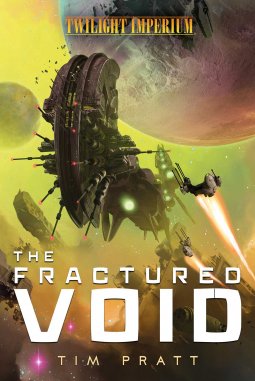
The Fractured Void, A Twilight Imperium Novel, by Tim Pratt (Aconyte)
Imagine my surprise when I learned the space opera. The Fractured Void, was based on a strategic board game, Twilight Imperium. Game tie-in novels are common these days, but not those that are so well crafted as to stand on their own merits. I picked it up because I loved Tim Pratt’s other science fiction novels (and after reading it I still have no idea what Twilight Imperium is, nor do I particularly care as long as Pratt turns out books as good as this one).
Starship crews as family are a familiar, eternally attractive trope. Pratt brings his own slightly offbeat cast to the Temerarious: a human captain, his best friend, a ninja chameleon toad, and his leonine security officer. From the universe’s most boring patrol, they’re off to rescue the universe’s most obnoxious scientist, who just may have discovered a way to create worm holes and to control them. It turns out that the mysterious race known as the Ghosts has very strong opinions about why opening new worm holes is as Extremely Bad Idea, and are prepared to enforce or sabotage or otherwise nix the project. Throw in a ruthless but very sexy bounty hunter, a sentient squid who is the universe’s best engineer, a remarkably hidebound rival culture, and a host of plot twists, double-crosses, and one-step-ahead schemes, and the resulting adventure is nonstop entertainment.
My introduction to Pratt’s star-spanning bibliography was The Wrong Stars, and The Fractured Voidfeatures the same flowing prose, superb control over disparate story elements, wacky characters, plot tension, and supremely resourceful and competent characters. I look forward to gobbling up his next.




